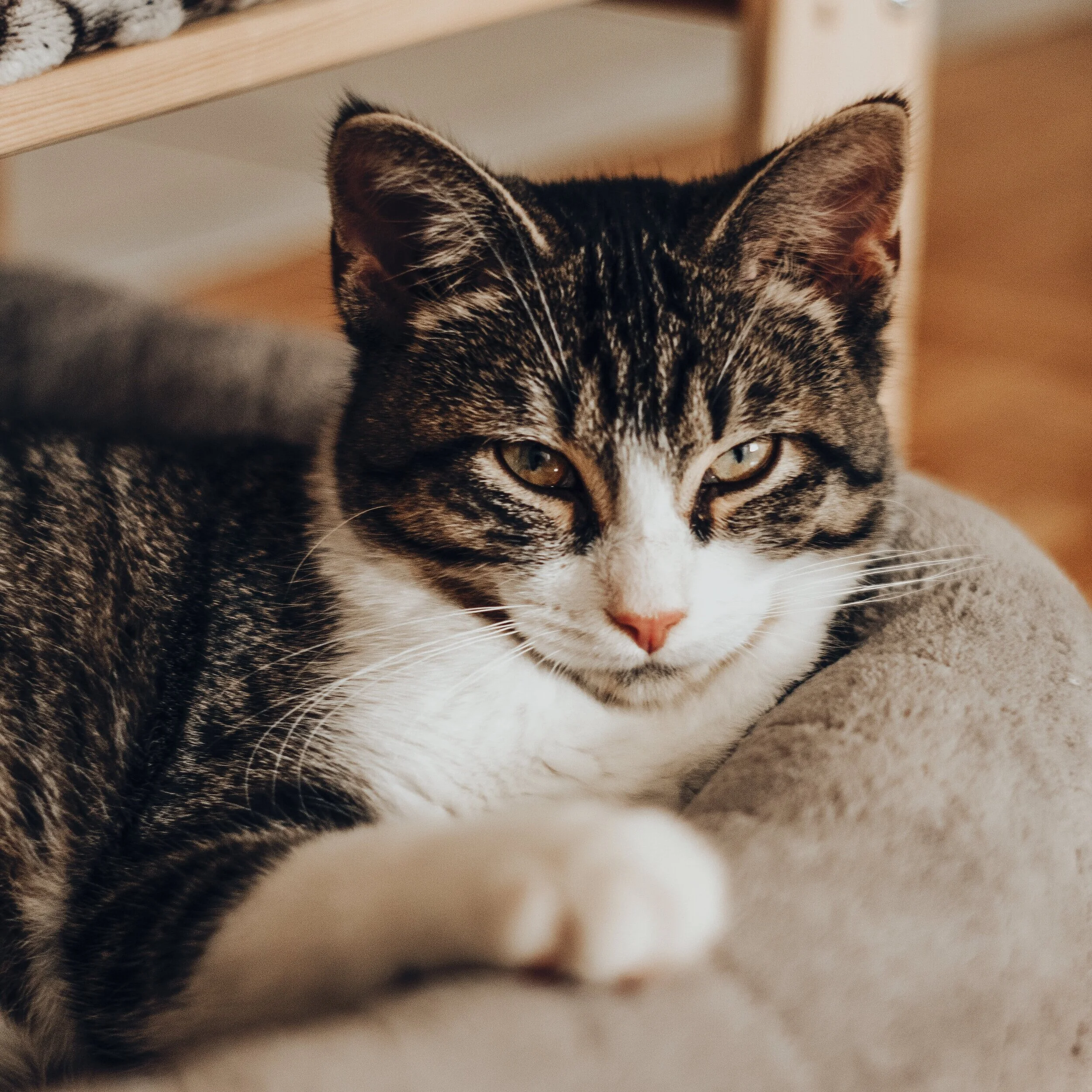Just like humans, age catches up on our pets too. Many pets are considered to be seniors after seven years of age depending on the type of pet and breed. As we go about our busy lives its important to pay attention to our pet’s health and be mindful of the common signs of ageing. Identifying and speaking to your local vet about any health concerns early can help prevent minor problems becoming more serious, whilst also improving the comfort level for your beloved senior pet too.
We have identified nine common signs of ageing to look out for in your senior pet:
Hearing loss
As your pet ages their hearing can deteriorate to. Certain types of hearing loss in pets are curable so it is worth speaking to your local vet first. In instances where it is not, there are a number of steps you can take at home to help keep your pet safe and comfortable.
Learn to communicate using hand signals or gestures. Establish a special signal for their name.
Place a bell on your pets collar so you can easily find them.
Buy a tag for your pet’s collar that says “Fido is deaf. If found please call …”
Wake your pet by putting food under their nose or gently touching them away from their face. Teach your children this tip to. Some pets may bite if startled when sleeping.
Make sure you use a leash if taking your dog for a walk as they won’t be able to hear cars or other potential hazards.
Reduced vision and other eye problems
If your pet is starting to bump into things, is startled easily or has cloudy or red eyes they may be suffering from vision loss or an eye disorder. Deteriorating eyesight is common in ageing pets, however it is worth taking your pet to the vet to rule out any treatable eye conditions. Some common eye conditions in senior pets include cataracts, glaucoma and dry eye syndrome.
If their condition is not treatable there are a number of tips our vets can suggest to help your pet adjust and feel more comfortable with their deteriorating or loss of eyesight.
Bad breath, swollen gums and other dental health issues
If you haven’t been following a dental care program at home such as brushing your pets teeth, offering dental treats or chew toys and taking your pet to the vet for regular dental check-ups, it is possible they may be starting to show signs of dental disease. Common signs include:
Red, swollen or bleeding gums
Bad breath
Yellow or brown tartar build-up on teeth
Sore or sensitive mouth
Difficulty eating or reduced appetite
Drooling
Loose teeth or teeth loss
Pawing or rubbing mouth
If you notice any of these signs or have any concerns about your pet’s dental health, give us a call on 03 8784 4444.
Growths, tumours and other skin problems
It’s important to check your pet regularly for lumps and bumps. Although most lumps are benign (not harmful), some are more serious (malignant). In such cases early removal and accurate diagnosis are important to maximise the chances of a good outcome. If you find a lump or bump on your pet, please make an appointment with one of our vets to have it checked out.
Your pet may also encounter skin and coat issues. These may show up as itching, rashes, hot spots, lesions, dry skin or hair loss. If this is the case it is worth speaking to your local vet as they can suggest solutions to help to alleviate the symptoms or even cure the underlying cause of the issue.
Age related diseases
Just like humans, there are a number of diseases that are more likely to affect older pets. These can include arthritis, heart disease, kidney disease, cancer and dementia.
Talk to your vet if you notice any changes in your pet’s behaviour or health as early detection, treatment and management offer the best outcome for you and your pet.
Weight gain or loss
Both weight gain and loss can be a sign of ageing. A reduction in exercise and a slower metabolism can cause your pet to put on weight, whilst a lack of appetite or issues with digestion can have the opposite effect.
Speak to one of our vets if you have any concerns about your pet’s weight. They can suggest a change in diet or exercise program that is suitable for your ageing pet to help improve their overall health.
Incontinence
Pets can find it increasingly difficult to control their bladder and bowel movements as they get older. Whilst most don’t loose total control, the occasional accident indoors can be quite common. Never punish your pet for such accidents as they can be distressing enough for them. Rather, give your pet more opportunities to go to the toilet throughout the day. If this doesn’t help, take your pet to the vet to make sure nothing is medically wrong.
Joint pain and stiffness
You may notice your pet becoming less active and mobile, especially in the mornings or after a long walk. Arthritis is another common sign of an ageing pet. It is important to adjust your pets exercise routine to support these these changes. Short gentle play or walks may be helpful in some cases. Whilst vigorous play and activity such as jumping, leaping and turning should be avoided.
Discuss with your vet whether dietary changes would be helpful. It is also worth introducing some home comforts such as a soft bed in a warm, draft free place or ramps for going upstairs or getting into the car so your pet doesn’t have to jump.
Behaviour or memory problems
As your pet ages, their behaviour can change too. They may become less interested in affection and attention or sleep more and have less energy. A pet suffering from cognitive dysfunction or dementia may also appear confused, unstable or irritable at times. Speak to your vet if your notice any of these behavioural changes in your pet:
Disorientation/confusion
Anxiety/restlessness
Aggression/Irritability
Avoiding social interaction
Excessive licking
Forgetting previously learned commands or house rules
Inappropriate vocalisation (barking, meowing, whining)
Lack of self grooming
Incontinence
Loss of appetite
Although there is no cure for cognitive dysfunction syndrome, your veterinarian can recommend a range of treatment options to help make your pet feel more comfortable and manage their symptoms.
All pets age differently, so it is important to care for your senior in a way that meets their unique needs. The first step is to pay attention to your pet’s health and understand the signs of ageing. Give your pet lots of love and attention and let your vet know of any changes or concerns you have as your observation may help prevent any minor problems becoming more serious.











